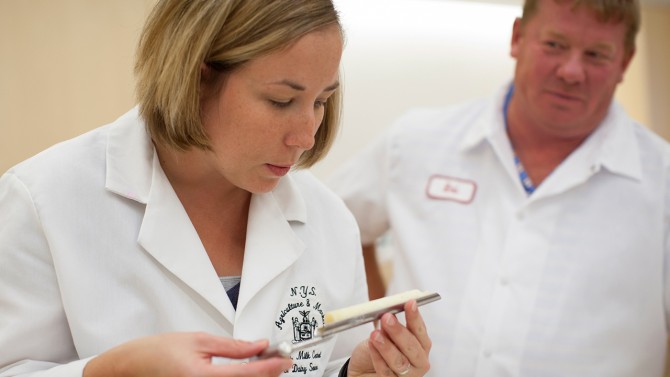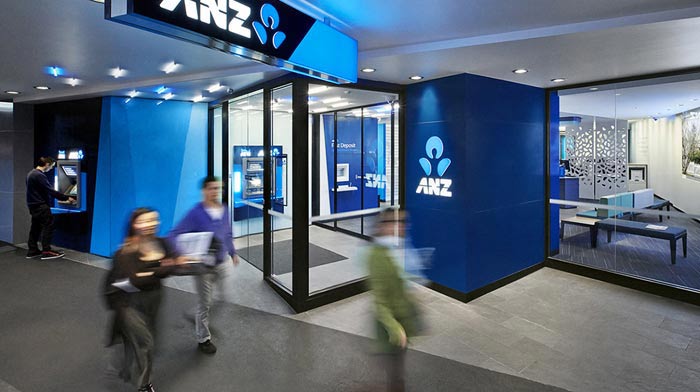Alan Glustoff, co-owner of 5 Spoke Creamery in Goshen, New York, describes Rob Ralyea as a detective, assessing clues others overlook.
As manager of the Cornell Food Processing and Development Laboratory, Ralyea oversaw dairy extension programs throughout the state for the past 20 years, specializing in cheese and artisan cheese production and safety.
Rob Ralyea, extension associate in food science, background, looks on as Heather Spraker, a dairy products specialist from the New York State Department of Agriculture and Markets, examines a cheddar core in judging the state’s best cheeses in 2015.
“He helped my company get to the bottom of a pathogenic bacteria problem,” Glustoff said. “While in the movies, a good detective has clues he or she can see, Rob was dealing with microscopic clues. I had hired several professionals who only wasted time and money. Rob was able to quickly assess the situation and come up with a plan that quickly fixed the problem.”
In a tough market for liquid milk, many New York dairies have found they can reap greater profits by processing and marketing their own products such as cheeses, bottled milk, yogurt, ice cream and butter. But each of these value-added sectors of the dairy industry come with its own set of production and safety challenges.
Glustoff, who makes raw cows’ milk cheeses, says Ralyea helped grow and develop the New York state dairy business “in more ways than one can imagine.” He also described him as the state’s secret weapon when it comes to award-winning cheese, yogurt, ice cream and other “value added” products.
Cornell is one of about 25 universities in the country with a dairy education and research component, producing dairy products for the campus and surrounding community since 1880. Cornell’s dairy plant also has an incubator program for those looking to enter the business or aiming to get a new product off the ground.
Ralyea, who retired in October after his team hosted its annual cheesemaking workshop, has been a significant part of that. He consulted on four award-winning cheeses from the most recent American Cheese Society competition alone: two Stocking Hall clothbound cheddars, an Oakfield Artisanal traditional Mexican Chihuahua cheese and Muranda Cheese Company’s Rosie’s Choice Young Alpine.
“Rob had a very unique combination of expertise in microbiology and practical dairy processing, along with a special talent for communicating with people,” said Martin Wiedmann, theGellert Family Professor in Food Safety and Food Science in the College of Agriculture and Life Sciences. “He used those skills to make a lasting impact on the dairy industry in New York and beyond.”
The fifth largest dairy state, New York not only makes a lot of cheese – 1 billion pounds last year – it makes noteworthy cheese. At this summer’s American Cheese Society Annual Judging & Competition, New York producers were awarded 31 medals across all categories, from farmstead cheeses to fresh unripened cheeses.
Ralyea describes the work he’s done as helping companies around the state with product development, troubleshooting problems, assisting with environmental monitoring and regulatory issues, “and a bunch of other stuff.” His work has aided the state in growing into the nation’s top producer of yogurt, sour cream and cottage cheese.
Gov. Kathy Hochul announced recently that $21.6 million is available through the Dairy Modernization Grant Program. They are looking for projects that help the state’s dairy farmers supply chain efficiency and that mitigate the need for raw milk dumping during emergency events. One answer: more cheese.
And in what was the birthplace of commercial cheese production in this country more than a century ago, New York producers have recently drawn together to launch the New York State Cheese Council, which held its first official meeting in October. Ralyea will now channel his expertise by co-leading food safety seminars for the cheese council with Rebecca Phillips, regional dairy processing specialist at Cornell Dairy Foods Extension.
“We thought there needs to be a network for people interested in getting into cheesemaking,” said Rachel Banks, president of the fledgling New York State Cheese Council. “There’s not a lot of market awareness of what’s out there, and we’re not connected.”
She says New York lost 1,900 dairy farms between 2017 and 2022, and cheese can be an added revenue streams. She says the council is interested in developing a state cheese label.
But adding cheese production to a dairy requires significant knowledge, specialized equipment, proper sanitation practices and potentially a long aging process to achieve the desired flavor and texture.
“When milk prices go down dairies say, ‘We’ve got to save the farm’ and they start looking to value-added products,” Ralyea said. “That’s what I was part of, helping people do things correctly when they’ve made that decision.”
Ralyea’s work extends beyond cheese, says Robin Waite, research and quality director for Perry’s Ice Cream, based in Akron, New York. Ralyea was an invaluable resource as Perry’s installed a state-of-the-art extruded ice cream package line in 2023, she said.
“He did some site visits and helped us monitor the project’s impact on the existing facility and for sampling as we ramped up production,” she said. “Rob is friendly, with a quick wit, and he’s always available to bounce and idea off of or to ask questions.”









